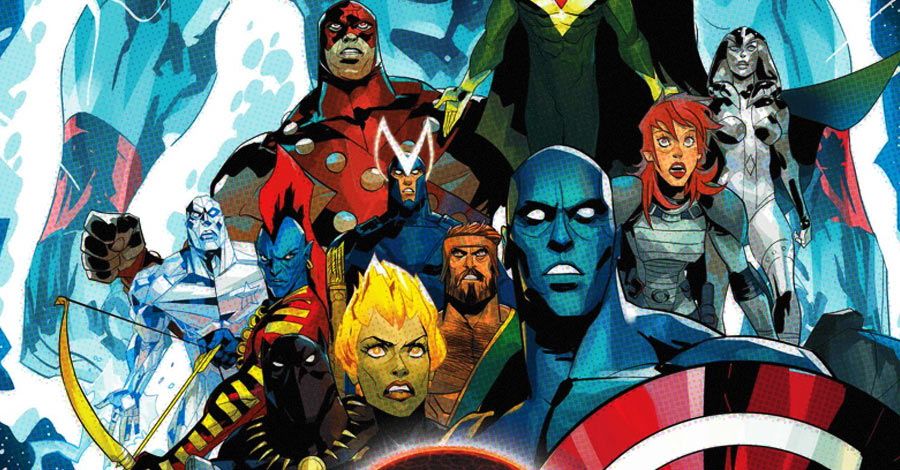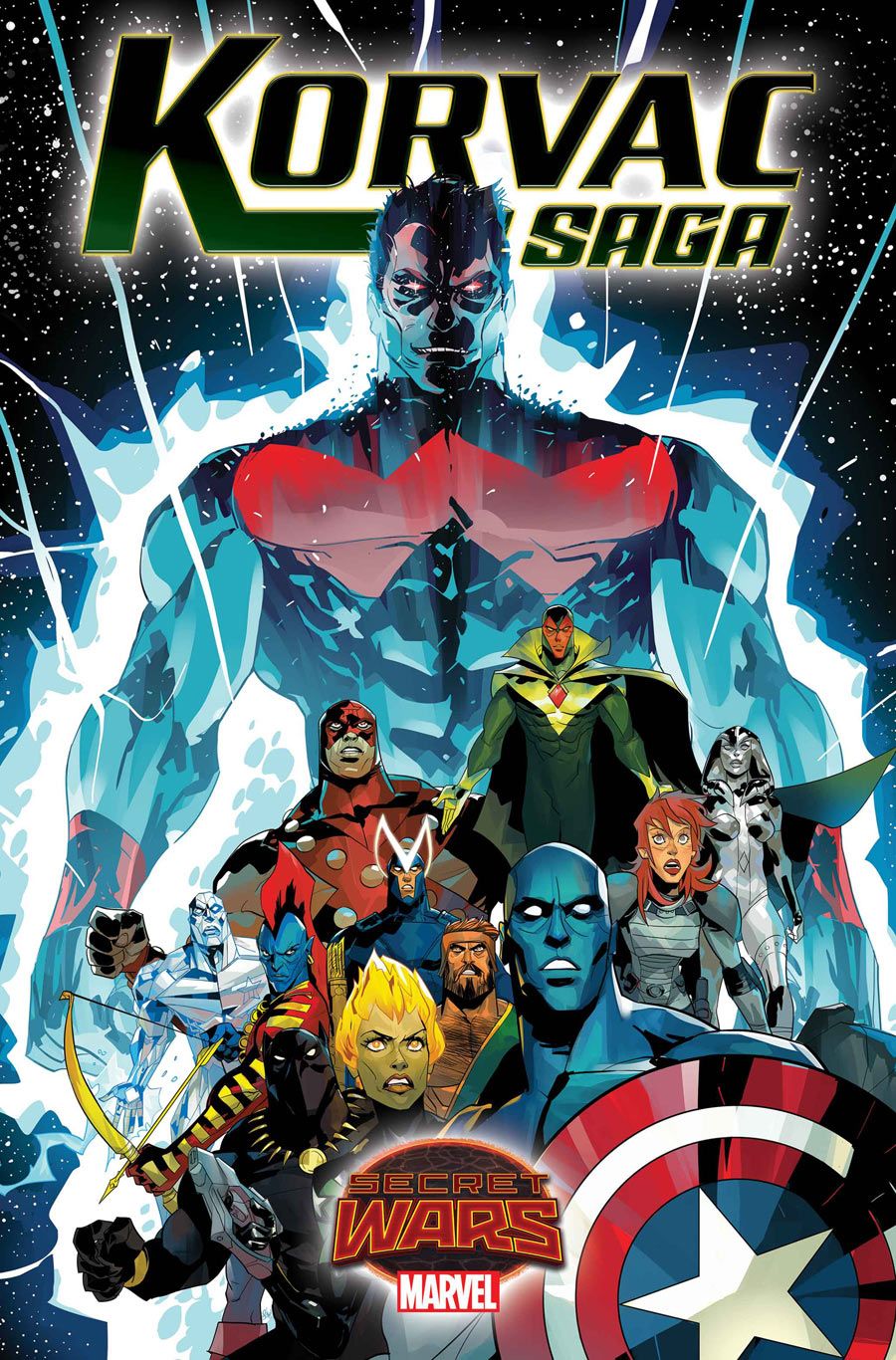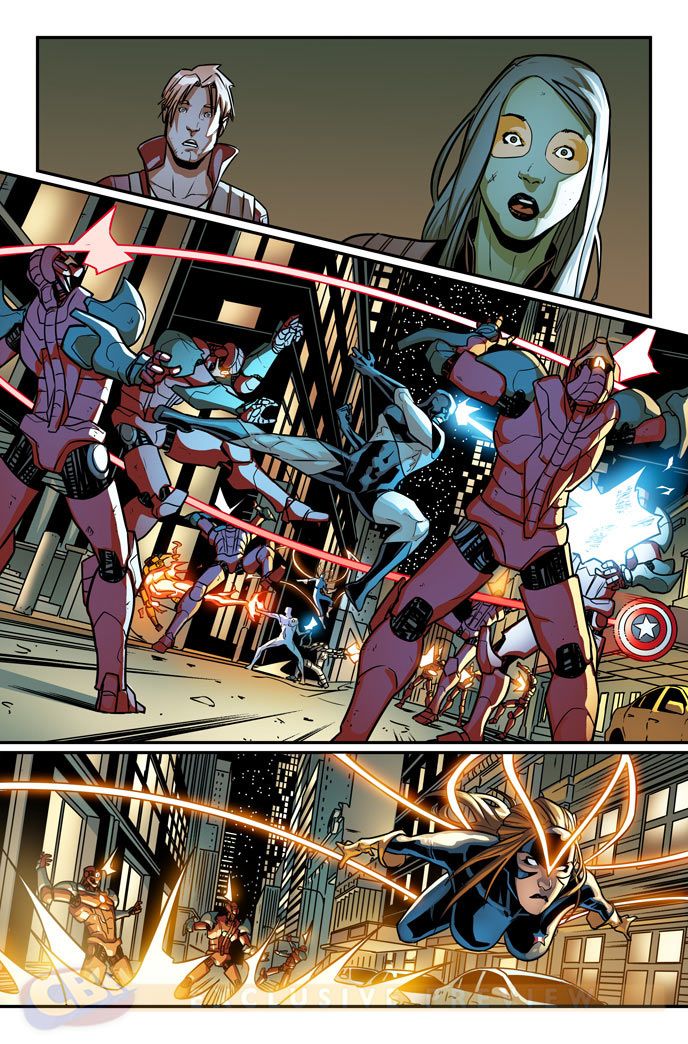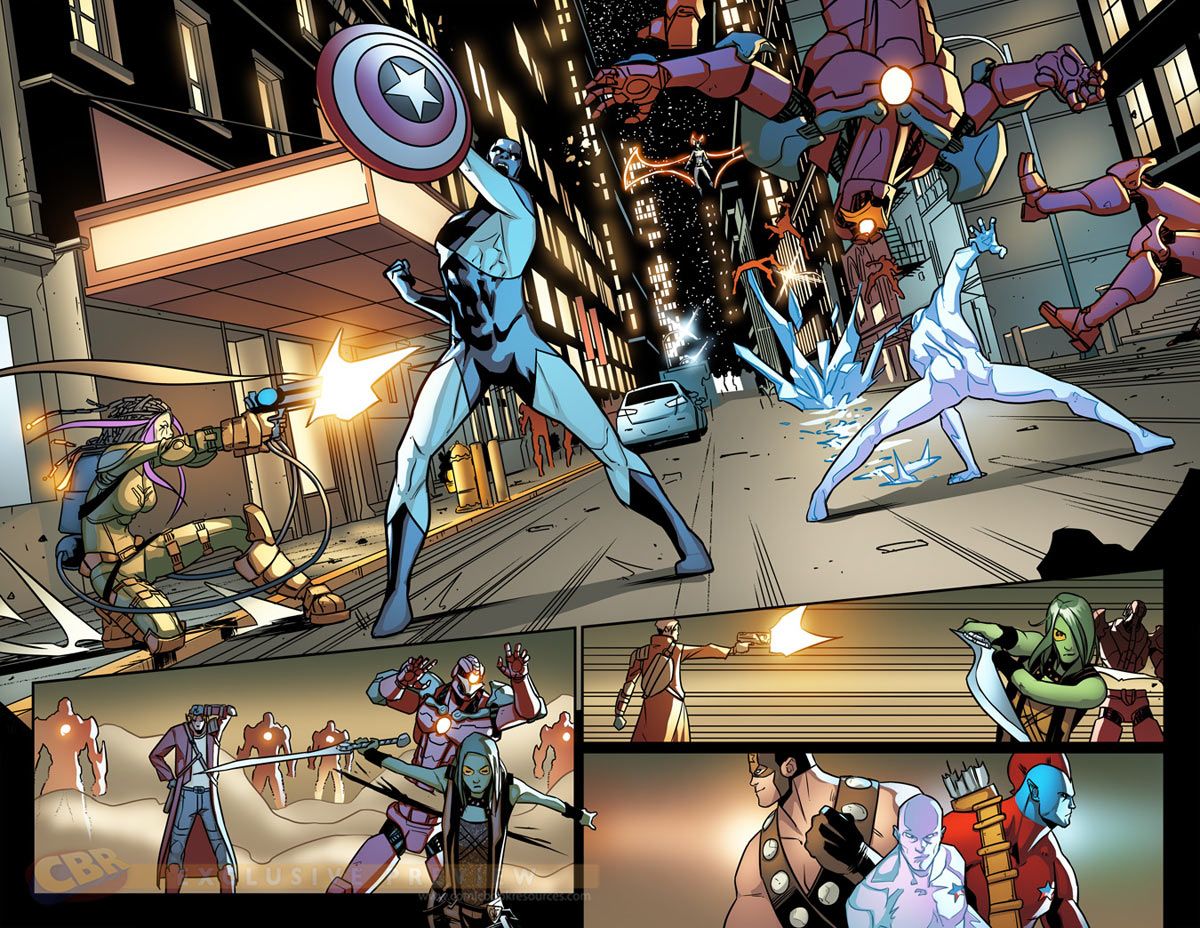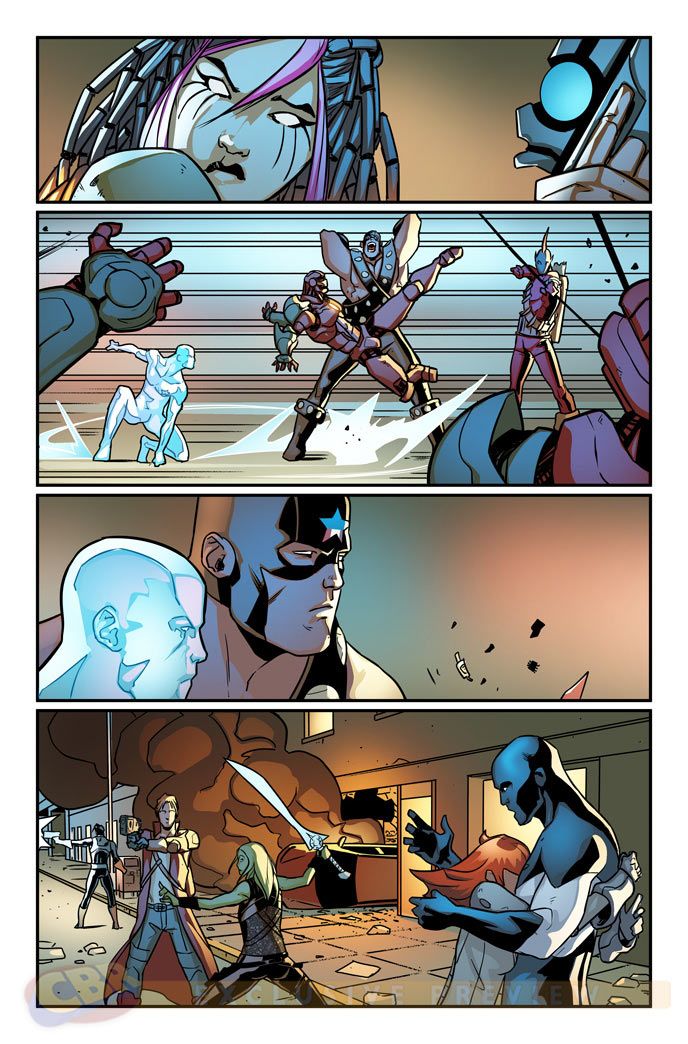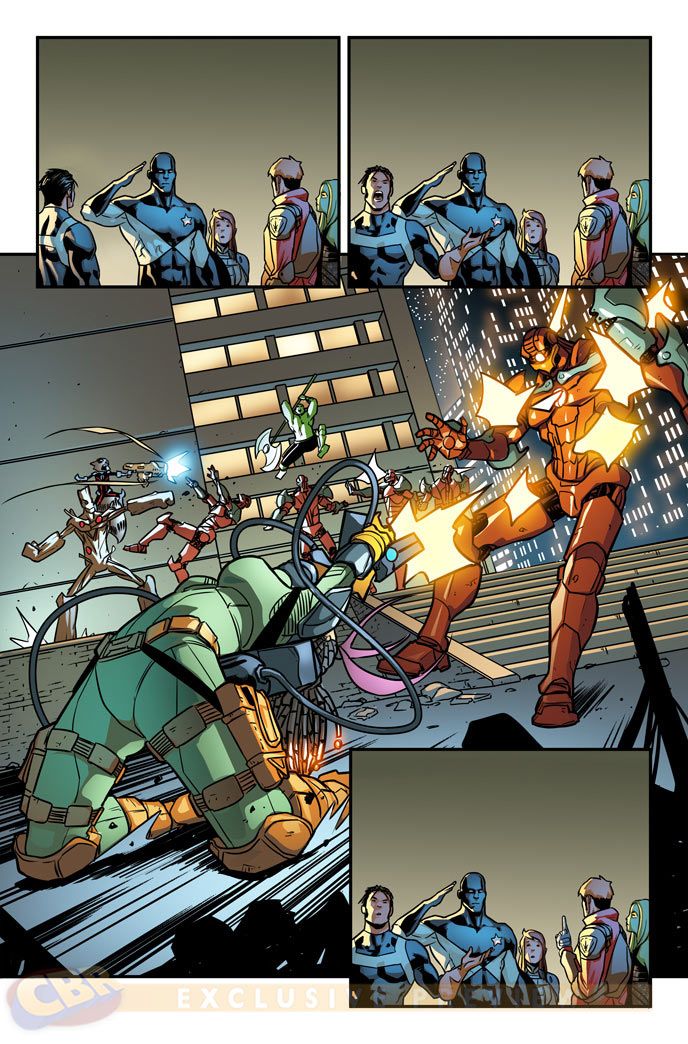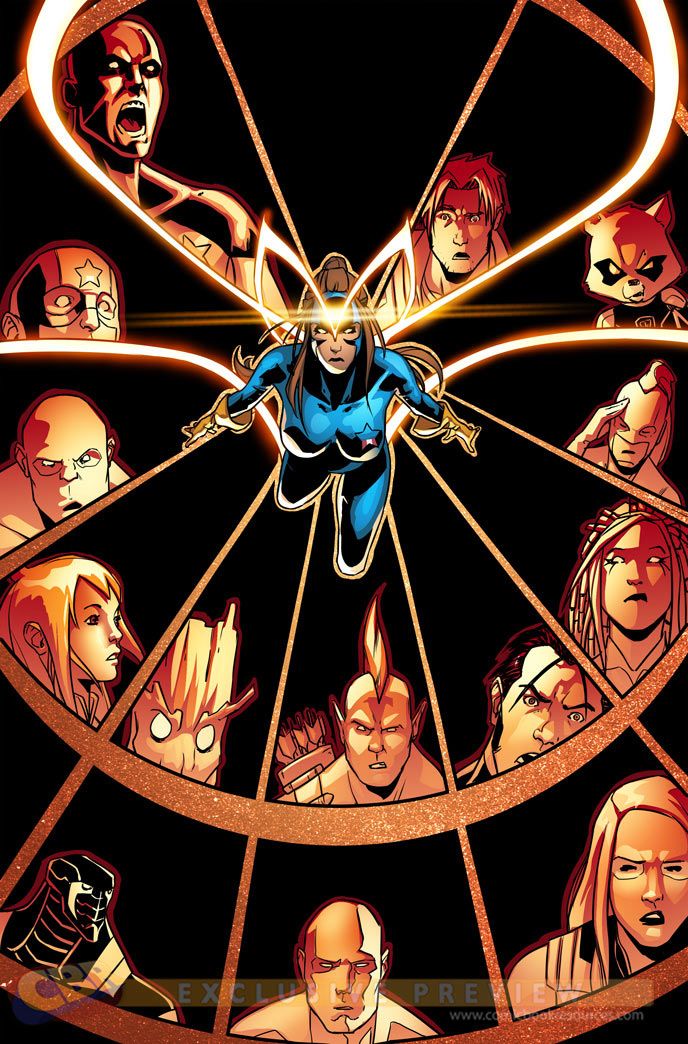Writer Dan Abnett has been telling cosmic tales featuring the original Guardians of the Galaxy in Marvel's "Guardians 3000," and the heroes will soon find themselves dealing with a mysterious temporal anomaly that threatens to collapse time itself, and to get to the root of that problem they must travel to the present and confront the modern day Guardians of the Galaxy.
When "Secret Wars" descends upon the Marvel U, however, the team -- or a version of them, at least -- will find itselfrevisiting the most epic adventure they've ever experienced. This June, Abnett and artist Otto Schmidt reimagine the classic "Korvac Saga" as a new story that unfolds on the patchwork planetoid called Battleworld, otherwise known as the new Marvel Universe.
CBR News spoke with Abnett about his love for the original "Korvac Saga," how his take mixes medieval intrigues and politics with modern technologies and superheroics, and the challenges and rewards of telling a Guardians of the Galaxy story in a world with no galaxy to guard.
CBR News: When "Secret Wars" and the "Korvac Saga" begins, the original Guardians will be on the Battleworld domain known as Forest Hills, ruled by Korvac, and they'll be in conflict with the heroes of a rival domain, Holy Wood, ruled by Simon Williams AKA Wonder Man. What can you tell us about these domains? What's life like for the average person under the rule of Korvac and Simon Williams?
Dan Abnett: It's quite strange, actually. When I went about constructing these domains, I thought Korvac, being the most powerful character in this subset, he's going to be the lord and this is going to be his kingdom. His kingdom will resemble the setting of the original "Korvac Saga," which is specifically the Forest Hills area of New York. It would also resemble the late '70s vibe of the original comics, so there's a deliberate nostalgic thing going on there.
I thought I would craft it more specifically than that, sort of take the various elements I could play with, choose the ones I wanted to play with the most and drop the ones that I didn't want to use. But, in fact, Battleworld is this extraordinary alchemical place where things have been blended together that shouldn't necessarily fit together. Yet they seem to work really, really well. There's this extraordinary blend of technologies. High tech, low tech, and all sorts of primitive elements as well. Societal structures might seem very medieval, but the language is very modern. The buildings might be modern, but some of the technologies might be low tech. So The Forest Hills, as Korvac's kingdom is called, is both recognizable yet full of oddness.
Korvac is the governor. His first lady is Carina Walters, his wife from the original story. He's sort of a powerful and benevolent lord of this domain. It sounds very "Game of Thrones," yet we're talking about a modern Manhattan with cars in it and modern technologies. There's this really odd blend, and I think it gives it a flavor; a very distinct flavor. This is not us doing a retro-medieval version of the Guardians. This is a really strange sort of mutation of what history was like. The Guardians are literally Korvac's Guardians. They are his household guard. They are his retinue, his inner circle of superheroes who are the primary line of defense, security, protection and peace keeping within his kingdom. There is a police force, but the Guardians are sort of the crack elite unit. They are led by Major Victory, whose name is a rank. He's "Major" Victory. A sort of Captain America-style identity.
They police this kingdom and look after it. There's all sorts of day to day problems in running a kingdom like that, but a very specific one has arisen. On top of that, there is a sort of friendly rivalry with the neighboring domain, which is Holy Wood where the lord is Simon Williams, the Wonder Man. His domain is structured very similar to Korvac's. It's a city. He has people underneath him, and his household bodyguard is called the Avengers. They are led by Captain, again a rank, Marvel.
They're sort of friends and rivals in sort of the same way neighboring lords in a feudal society would be. When they get together, there's a big feast and all of their warriors drink together, but if war arose, they would be foes.

In our series, there's a political summit going on where these two leaders are meeting to discuss the future of how things are going to work. There's a bit of a class struggle, and in the background, something bad is happening in the Forest Hills that Korvac wants sorted out as quickly as possible. It could endanger the sort of political currency in the talks he's having with the very charismatic Simon Williams.
So with that description the story does sound very medieval and it is in terms of its structure and politics, but it also oddly modern. So God! I hope this works! [Laughs]
What else can you tell us about Holy Wood? It could be just me --
It's not just you. It's very deliberate. He's Simon Williams, the film star from Hollywood, so his domain is the Holy Wood. It's putting a medieval kind of Dark Ages spin on the whole idea. I'm trying to obliquely reference the things we know about these characters in what was the Marvel Universe. So everything we know about Wonder Man is there, but it's lensed through this idea of an oddly stratified society and therefore has this kind of medieval ring to it even though it's in modern dress. It's like Shakespeare in modern dress! That's what it is!
[Laughs] I've managed to find a saving way to describe it.
What went into your creation of the lineup of Simon Williams' Avengers for this story?
All the Avengers who appear in the story were in the original "Korvac Saga." The Avengers roster at the time was immense. It really was extraordinary. I don't know if it was just prior to a cull of the number back down to a more manageable group, but it did seem like almost every Avenger was there in the mansion.
The original saga took place at a time where Henry Peter Gyrich was trying to close the Avengers down and limit their power. At one point you had like 47 Avengers catch the bus because they weren't allowed to use a Quinjet. It was a surreal moment. [Laughs]
I looked to the roster there, and the obvious thing to do was pick all the key Avengers like Captain America, Iron Man and Thor. It occurred to me, though, that we're going to see those characters in other places during "Secret Wars," and to have repetitions or alternate versions was unnecessary. It was really nice to take some of the beloved characters who haven't been in the forefront of the Avengers for a while, or are particularly redolent of the time period, and to use those to make those the team.
I went down the list of characters who were present during the original "Korvac Saga" and made my selection. So we have Hercules, who's fantastic. We have Black Widow. We have Black Panther. We have Jocasta. We have the Vision. We have Yellowjacket. We also have Moondragon. She was part of the original "Saga," but there's Guardians connectivity there as well, which I thought was a nice touch.
Both Captain Marvel and Ms. Marvel appeared in the original "Saga." In our story, we have the now dead and forever dead Captain Marvel. I thought we had a nice way of putting him into this story without bringing him back from the dead.
In the original "Korvac Saga," Iron Man is the head of the Avengers, and he's vying with Captain America who is usually the boss. So in this story, Captain Marvel is the boss, and again, we're using the rank to reflect the way the society works.
So yes, everyone who is in the Avengers in this story was in the original "Korvac Saga." In fact the only character in this series who wasn't in the original is Gina Drake, who I brought over from "Guardians 3000."
So, when this new "Korvac Saga" starts, both the Guardians and the Avengers are on an equal moral footing and neither of them are really "villains."
Exactly. It's mentioned several times in the first issue, but the kingdoms are under threat every day from all sorts of things like crime, invasion and other threats connected to Battleworld that I can't and won't mention at this point. They also have to contend with super villains. That's why the Guardians and the Avengers exist in their kingdoms.
In the "Korvac Saga," we're dealing with a very specific problem. It's almost like an idea virus. People are suffering from dreams, which are showing them a different truth that is so violent and unpleasant for them that they begin to transform, in monstrous ways. Korvac wants that dealt with, and the Guardians are dealing with it. Then, when the Avengers arrive, they're like, "We're a bit worried about the security of our lord because you have this problem going on that we've heard about." The Guardians, of course, assure them everything is under control, but I'm sure it will all end in tears. [Laughs]
So on top of superheroics and medieval intrigue in modern dress, the "Korvac Saga" is also a contagion outbreak tale?
Yes, to a certain extent. There's a bit of detection going on there as well. The Guardians mission is to find out what this problem is and shut it down without alarming the public. They can't shut down the city because they have this important conference going on. So they need to work out where it's going to happen next and lock it down.
So, yes! God -- we've got everything in this story! [Laughs]
Earlier, you mentioned Carina Walters. She played a fairly significant role in the original "Korvac Saga." Will she play a large role in your story?
Yes, she plays a considerable role in this story. Carina is a very interesting character. In the original story, Korvac is sort of this super-powered genius from the Guardians' future who returns to Earth with godlike powers that he uses to transform himself from a cyborg into this incredibly handsome, charismatic, super-rich guy who is going to be god of the world. As his consort he chooses, Carina, this beautiful supermodel he sees at one of Janet van Dyne's fashion shows. He sort of shares his powers with her. She becomes a goddess alongside him. She's sort of his consciousness and is also the one who's alarmed by his propensity to overstep the mark of what he can do as a character.
As far as I'm concerned, she's a vital part of the Korvac dynamic from the original story. It's also great to have her in this story as the First Lady to his sort of President. She's sort of this beautiful, charismatic woman. She may seem like this trophy wife who stands up and introduces her husband and does all these diplomatic things, but she is right there in the middle of the crises in our story from the word go.
Carina and the other characters of the "Korvac Saga" are being brought to life by newcomer Otto Schmidt. From what I've seen, his art appears to have a fun animation-style vibe, but his characters also have a whole lot of attitude to them.
Yes, they are absolutely full of attitude! He's great. I'm enjoying what I've seen of his work so far. His first cover was stunning. We originally were going to go with the idea of doing homages to the original "Korvac Saga" covers, doing versions of them with the new characters in them. In fact, I think that is going to happen, but with the first one Otto came up with this fantastic image. Plus his character designs, in particularly Hercules, look so powerful and full of attitude. They're really great looks.
I had been enjoying working with Nico on "Guardians 3000" so much that I was hoping I could work with him on the "Korvac Saga." He's got to finish up "Guardians 3000" though while Otto gets started on our "Secret Wars" story. So they showed me what Otto could do and I thought it was great. If anything, his work adds another different flavor to that already flavorful mix of strange things coming together.
I've got a really good feeling that it's going to come together and be one of those dishes that has got loads of flavors in it that all work together, rather than have you going, "What the hell have they done here! It really didn't need the carrots or the ginseng!" [Laughs]
The original "Korvac Saga" started out on Earth, but the scope and scale of the story gradually got bigger and bigger. Are able to mirror that at all for a story that's based in a universe that's comprised solely of Battleworld?
It's really interesting. In fact, that was probably the hardest thing to get my head around for a number of different reasons. The stuff that's been shared with me about "Secret Wars" has been incredibly impressive. I've been blown away by the way it's been built, structured and brought up. This is not an arbitrary, "Hey let's do this!" story. This is really a beautifully thought out Marvel Universe event.
Of course, from my point of view, and I'm sure there are other books that will share this problem, I'm dealing with the Guardians of the Galaxy -- and there is no galaxy. There's no stars or other worlds. There are none of the reference points that make the Guardians of the Galaxy, the Guardians of the Galaxy.
If you're writing the Avengers in this situation, what you're doing is depriving them of the opportunity to have sort of cosmic adventures and the idea that there is or should be a cosmos that they could explore. They're still the Avengers though, and they're still on Earth, so you can sort of ignore that.
With the Guardians, though, there's nothing. And in fact, instead of ignoring the elephant in the room, I made it part of the story. The lack of cosmos is noticeable -- not to them personally, because they don't know better, but in terms of the way this idea fabric is breaking down, the disease that's spreading, the lack of cosmos is noticeable. You've almost got characters pointing and going, "The Guardians of the Galaxy? What does that even mean?"
At the beginning, this was one of those imponderables. I was thinking that I would have to think my way around it really, really well to either disguise it or shove it to one side. Then I went, "No! I'm just going to embrace it whole-heartedly and make it part of this story." And it worked out really, really well. It was quite good, actually, to make the Guardians a terrestrial-bound super team for a change; to sort of play them as if they are the Avengers, operating out of New York and doing things they have to do. That makes you look at them again as superheroes.
You can't do anything in Cosmic stories, but all sorts of fantastic and amazing things can happen in them. People can do all sorts of extraordinary things because they're beyond the remit of Earth, gravity and atmosphere. When you have them on the ground and in need of transports and those types of things, they become a proper super team, and that's quite a creative way of focusing on them as characters. I've learned more about them by doing that rather than having that literal freedom of, "Next week, I'm going to a different planet where everyone is blue and the moon is made of cheese." The rules here are tighter, so it shows the inherent strengths of these characters and their power sets.
As a longtime fan of Marvel Cosmic stories and the writer of "Guardians 3000," how did it feel when Marvel asked you to do a new take on the "Korvac Saga?"
Great. In fact, I suggested it to them. One of the premises of "Secret Wars" is some of the regular titles are going to be transformed and we're seeing those characters in different settings determined by the rules of "Secret Wars."
I know "Korvac Saga" is technically an Avengers story rather than a Guardians of the Galaxy story, but it did involve the original Guardians. In some respects, it's one of their most significant adventures in their long publishing history. If you were to pick a villain to represent the top of the tree of their opponents, Korvac is certainly the most powerful and very significant.
So I suggested that idea, and everybody at Marvel went for it within five minutes of me suggesting it. They said, "We'll get back to you." A few minutes later, the phone rang and they're like, "Yes! Let's do it."
I've always loved the "Korvac Saga." It's a great story, and I reread it from time to time. In some respects, it's not a perfect story because it has quite a strange shape. It was a saga that ran over quite a few issues, and was sort of mixed into the ongoing continuity of the Avengers book instead of being a defining story arc. It came and went through quite a lot of issues and tied into Guardians continuity. Korvac's own continuity was quite complicated, as well. I think it was a case of the writers and creators involved picking up all these bits and pieces and making sense out of them and streamlining them into a very strong story. To me, it's a very notable story because it plays out unlike any other big superhero story, certainly any other Avengers story, in that the shock factor of what happens when a vast number of Avengers and the Guardians of the Galaxy finally track Korvac down.
It's also interesting in terms of the sort of inverted villain Korvac actually is. Because although he is supremely powerful and capable of ruthless and really appalling actions, he's not, strictly speaking, a villain. His agenda and higher purpose could be regarded as moral and good. It's just that he's going about it with human imperfections. He has a great scheme, but he doesn't deliver it well. That leads to frustration, and ultimately, the deliverance of the story is brought about by his own recognition of his own failing.
It's one of the few times I can remember where the assembled heroes mourned what's befallen their adversary and the way things had to play out. There's a sense of tragedy to it. And I must say, it's a very shocking story. I won't spoil it any further -- if you haven't read the original "Korvac Saga," I urge you to go and read it. It's very much of its time, but it has a very unusual and quite shocking ending.

I'm very excited to see what I can do with those components and I'm not out to repeat that story at all. This is simply a story that has the original Guardians and a large team of Avengers, many of whom are cool ones from that era, and Korvac. From there we let the fun begin.

